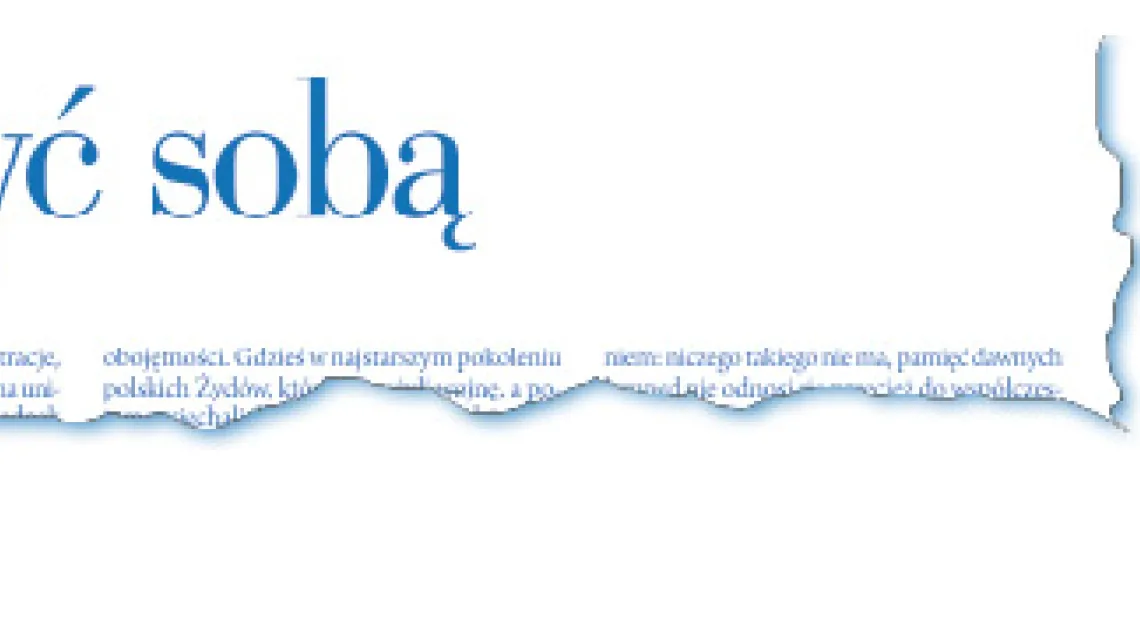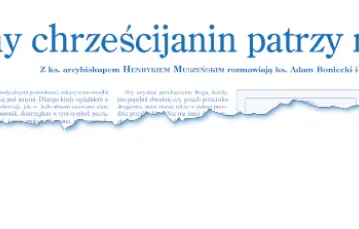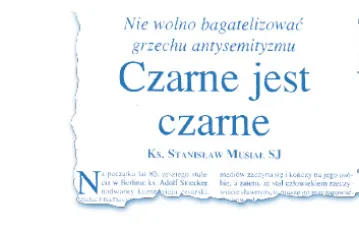Wykupienie dostępu pozwoli Ci czytać artykuły wysokiej jakości i wspierać niezależne dziennikarstwo w wymagających dla wydawców czasach. Rośnij z nami! Pełna oferta →
This essay appeared in Tygodnik Powszechny No. 31/09 and provoked the polemic by Ireneusz Krzemiński in Tygodnik Powszechny No. 35/09 (The Warsaw sociologist wrote: "There is still no agreement in Poland about how to involve those who incite hatred in discussions that would undermine or at least blur their black-and-white view of the world. But how can one even enter a discussion in which it is clear from the outset that the position taken by one side renders an exchange of views impossible?") On 11 December 2009, the monthly magazine Press awarded "I just want to be myself" the Grand Press prize for best feature article of the year.
Some graffitti scrawled in a Kraków underpass reads, "down with Jewish anti-Polonism!" Whenever I pass it I think to myself, yes, of course, but what if we added, "...and down with Polish anti-Semitism." Anti-Semitism has been the subject of honest public debate for some time now in Poland, while anti-Polonism has not been treated in the same way, not in Poland, nor in Israel or the United States. It is mostly discussed by anti-Semites. Good for them.
Mine is an unpopular view, for I believe that to improve Polish-Jewish relations largely depends on the extent to which we allow anti-Semitism and anti-Polonism a public platform. When pushed into the gutter, they become brutish and rotten, exuding poisons that damage society as a whole. Perhaps we shall not be able to change those people’s views, but by openly addressing sensitive issues and providing an outlet for negative emotions, we will make it easier to heal the relationship between our two nations.
Names Can Hurt
Jews and anti-Semites cannot live without one another. Without anti-Semites, Jews would be a normal people in whom others took little interest; without anti-Semites, there would be no state of Israel. And were there no Jews, anti-Semites would have to invent other worldwide conspiracies by the forces of evil, or express their thirst for battle on the sports field. But then they would not be what they above all want to be - destroyers of the Jew.
Before the war, between Semites and Anti-Semites there was a kind of gentleman’s agreement. Anti-Semites were simply anti-Semites and were never offended if someone call them such. For anti-Semites, the word "anti-Semite" was hardly an insult. They fought the Jews openly - on the streets, in newspapers, in parliament. They organised demonstrations, boycotts of shops, and segregation in universities. Everything was straightforward. Nowdays, however, it is not the done thing to be against a people as such, as a result of which the identity of the anti-Semite is becoming distorted. He must convince himself and others that he is not one, but that is not so easy. "I am not an anti-Semite, but...why did the Jews do this, why did Israel do that, etc." Even the fact that he cannot call himself an anti-Semite is the fault of the Jews, another consequence of "Jewish liberalism," by means of which they seek to control the world.
Antisemitism is usually described as prejudice or wickedness. No cultured person wants to listen to an anti-Semite, nobody takes what he says seriously. But I say that we should listen to the anti-Semites, whittling out the grains of truth embedded in the miasma [miąższ] of their obsessions, myths, and lies. Genuine anti-Semites interest us, and many Jews, myself included, know it. We are important for them, which has a value of its own. So it is worth talking to them. And although anti-Semitism in the 20th century turned into the crime of the holocaust, this kinship with the Nazis, which besmirches the honour of today’s anti-Semite, inspires not only hatred, but also sympathy. In general, they wish to have nothing in common with Hitler, but inevitably they do.
Silent Anti-Lechitism
To be honest, I prefer a healthy Polish anti-Semite to a Jewish... what shall we call him... "anti-Lechite"? Although anti-Polonism is as common among Jews in Israel and the United States as anti-Semitism is in Poland (at least as far as one can tell; nobody has researched it), the relationship between them is not symmetrical. In some ways anti-Polonism is worse, based as it is not on unhealthy fascination, complexes, and morbid imaginings, but on something that is overpowering, almost inhuman: sheer indifference. Somewhere within the oldest generation of Polish Jews who survived the war and emigrated to Israel or elsewhere there is a wellspring of horrible memories in which the Pole frequently plays an appalling role - blackmailing, hurling insults, plundering.
These poisoned though genuine memories are transmitted to children and grandchildren, who know that they are subjective and one-sided but are nevertheless prevented thereby from thinking about Poland sympathetically. Yet, they do not want to think about Poland with hostility either, especially as they detect the sentimental tone in the words of their grandparents. As a result, they, particularly those with no connection to Poland, think nothing at all. And so, an almost universal agreement prevails among Jews that Poland is a country that was for some reason chosen by the Germans for the murder of the Jews and in which antisemitism was and probably still is a bigger problem than elsewhere. It is a land of scorched earth, a black hole, to which Jews travel solely to prostrate themselves before the victims of the holocaust.
For who would go on holiday to such a place? Who would want to make the acquaintance of people living in a country enveloped in the smoke of the crematoria? Indifference seems the most honest approach. When, doing their natural duty, Polish Jews try to break through this indifference, they attract apparent displays of sincere interest from their Israeli and American compatriots. And when they desperately pull out their heaviest artillery - Żegota1, Irena Sendlerowa, Henryk Sławik and the 6500 trees at Yad Vashem - the response is often, "Oh, really, I didn’t know that. Would you like some more coffee?"
It is easy to become disheartened - with the old anti-Lechites one can at least have a discussion, even if one cannot change their views, but their children and grandchildren are simply not interested. Jews react to the accusation that anti-Polonism is widespread among them with surprise or impatience: there is nothing of the sort, they say, the memory of former crimes does not apply to contemporary Poles. The denial and perhaps even unawareness of the existence of anti-Polonism is stronger in the Jewish world than the denial of the existence of anti-Semitism by Poles.
The antilechitism in Israel is unspoken. No one writes "Poles to the gas chambers!" on the walls, nobody publishes lists of Jews with Polish blood who are conspiring against the Israeli homeland, and Israeli internet forums are not seething with anti-Polish sentiment. Ignorant people - of whom there is never a lack - do not claim that Catholics are kidnapping Jewish children and using their blood for the Eucharist. Nor does it occur to anyone to pray for someone’s conversion to Judaism. And were someone to say of Menachem Begin that he was really called Biegun and was a Pole, and therefore was not to be trusted, even the oldest Rabbis would not know what all the fuss was about.
The Uses of Anti-Semites
Of course, there is unspoken anti-Semitism in Poland. Many people say nothing but simply feel dislike towards Jews, with varying degrees of shame. There are also many Poles for whom the Jews are a matter of complete indifference, which is just what the majority of Jews would want. But we still have that "healthy root" of authentic, honest anti-Semitism, the one that scribbles on walls and grubs around in archives in search of the "real names" of the enemies of the people. Our anti-Semites are dangerous. Which is why a Polish Jew neither ventures on to the street in a yarmulke nor hoists the Israeli flag on Israeli independence day. He is often afraid even to speak of his Jewishness for fear of being accused of "shock-tactics" or "provocation." >
> But as there is no lack of recovering anti-Semites who still get excited by someone’s Jewish origins and thereby seek to prove that they have completely freed themselves from anti-Semitism, the Polish Jew must reckon here as elsewhere with a measure of unsought for popularity. One cannot, then, be a Jew in Poland in the same way that one can in Britain or the USA. There is always some sort of risk or controversy. Some Jews even enjoy this, though many others do not. And whoever says that he is both a Jew and a Pole gives the impression of claiming too much for himself, of wanting to have his cake and eat it. Because of this there are also those who are completely silent about their origins precisely so as not to enter the song and dance of such ambivalence. In Poland, the naturalness or normality of being a Jew is an almost unattainable value, the more so as whoever tries hard to be natural creates the opposite impression.
In any case, we Jews are a little afraid of our anti-Semites, and fear is not conducive to a natural way of life. But people are also a little afraid of Jews. Apart from professional Jew-hunters, no one wants to criticise Jews openly or harm them, in case they reveal themselves to be an anti-Semite. In the end, who knows, perhaps Jews really are powerful and can take revenge.
So, things are not good. But they are better than they were and getting better still. I think that there are two features of the relationship between Jews and anti-Semites that provide hope for a normalisation of Polish-Jewish relations in general. One is that grain of truth I mentioned earlier. It is a good thing for every nation to remember the dark episodes in its history and one should be grateful to those people who help in this. It is thanks to anti-Semites that Jews have begun to speak openly of those things in Polish-Jewish relations that are embarrassing or shameful for them, such as the friendly relations between many Jews and the Soviet occupiers or the participation of Jews in Soviet partisan groups at the end of the war.
So, slowly we are working out a shared, moderate, and just way of talking about Polish-Jewish relations in the past. Criticism of Jan Tomasz Gross’s book need not be seen as anti-Semitic, nor its defence as anti-Polish. Time passes, emotions cool, and a tone of moderation and objectivity triumphs. There are scholars who will inform us about these matters in an honest way, without whitewashing or defaming. We should listen to them.
The second feature of the conflict between anti-Semites and Jews, and an equally promising one, is that miasma of prejudice and lies surrounding the anti-Semitic grain of truth. It is soft and decaying, meaning that anti-Semitism is generally intellectually weak and unattractive even for anti-Semites. Fortunately for Jews and for Polish-Jewish relations, anti-Semitism is based on entirely false premises. In the longer term, truth and goodwill will always triumph.
What are those false premises? The most important runs: Jews, regardless of their differences, represent a global community of interests, and collaborate with one another for the realisation of those interests, with damaging consequences for other nations. In fact, if it is true of Poles that in emigration they do not much stick together, then it is even more true of Jews. The claim that Jews are conspiring and seeking to promote "their own" people wherever they can, and acting against the interests of the Polish nation in the name of their own goals, all out of a desire for wealth and power, is met by Jews with helpless laughter. The claim is so absurd that it is even difficult to get angry. Indeed, it would be nice if Jews in Poland were actually capable of doing something as a group. For now, they hardly do any lobbying at all, laudable or otherwise. Although it is completely false, in a certain sense the conspiracy claim flatters us, because it is a reminder that we are seen as powerful and dangerous. This is not true, however: we are neither powerful nor dangerous. Even Israel, armed to the teeth and fearless, is only a small country, dependent on America for the protection of its existence in a sea of hatred.
The Jew Has Many Faces
So, these words are directed not only at typical readers of Tygodnik Powszechny, who are good Catholics, wholly free of anti-Semitism. This respectable journal is also read by non-believers and indeed by anti-Semites seeking justification for their own anger. I cannot hide the fact that I want anti-Semites in particular to read this article, which is partly about them and in which a Polish Jew extends his hand to them.
Polish Jew? Our anti-Semites take it as given and self evident that one cannot be a good Pole and simultaneously a Jew, let alone one who supports Israel. Nonsense. Poles in the USA are often model Poles and at the same time American patriots, because there is no conflict between Polish and American national interests. It is no different with Poland and Israel. Apart from the partially shared cultural heritage and partially common history of Poles and Jews, Poland and Israel are not united by any significant interest, nor are they divided by any significant conflicts. A dual Polish-Israeli patriotism is highly possible.
The attachment of Jews, including Polish Jews, to Israel clearly does not imply support for this or that activity of the Israeli government. Jews in Israel, as well as Jews scattered throughout the world, have widely varying political views and very different opinions about Israeli policy and the conflict in the Middle East. There is no question of any uniformity. It is the same with world views more generally. Anti-Semites maintain that a Jew is always a Jew, which means that, regardless of the views he expresses, he will always be anti-Polish and anti-Catholic. Moreover, they claim that communism and atheism, and their mutation, liberalism, are Jewish inventions that undermine Christian nations and reinforce Jewish world domination.
Nothing of the sort. If a Jew is a liberal, or worse, an atheist or communist, every nationalist and traditionalist - rabbi or priest, Jew or Pole - will be his enemy. So, somewhere in this anti-Semitism a decision has to be made; either (along with many Jews) we don’t like Judaism, or (along with many Jews) we don’t like Zionism, or communism, or some such. In any event, the poor anti-Semite will have on his side some unwanted allies in the form of a significant proportion of Jews. For Jews are, ideologically, no less internally divided than any other nation of the free world.
Who is Chosen
The thing that really harms the anti-Semite is not his own, not very clever notions, but the truth. Only the truth can truly hurt. That truth is complex and still shrouded in the taboo surrounding the relationship of dependence between the Christian and the Jewish religion. Judaism’s chronological seniority, holy scripture shared with the Jews, the fact the whole story told in the gospels was played out among people who were circumcised, who went to Jewish temples and carried out Jewish rituals, the fact that for the first few centuries most Christians were Jews - for the anti-Semite all this is deeply humiliating. Faced with the statement that Jesus and Mary were Jews, he stands dumbstruck with horror and confusion. Jews? Never! Maybe Palestinians, Israelites, former Jews, but Jews? Never ever!
Where does it actually come from, this feeling of hurt and humiliation at the thought that the Christian faith is rooted in the Jewish world? Most likely it is connected with the need to recognise Jews as "elder brothers" and to respect them accordingly. Better, then, to accept the lesser of two evils, the idea that the chosen people failed God and lost their privileges, proving themselves unable to recognise the true messiah; that Christians took upon themselves the prerogative of the chosen people, of the new Israel. Believing Jews take an equally pessimistic view of the matter. For most of them Christianity is one of many sects that followed a false messiah, that broke the commandment to worship only one God, honouring him in three persons, one of whom was human, to Jews an especial blasphemy.
There is nothing original in my suggestion that the most profound bases of anti-Semitism are religious, that anti-Judaism preceded anti-Semitism. Perhaps, however, the view that I would like to express here, that anti-Semites have a right to their religious principles, is not entirely banal. If it is part of somebody’s religiousness to condemn those who do not convert to that religion, despite the fact that they were called to it, then so be it. We may not like other religious faiths but we should tolerate them. Let us allow all religious believers to be themselves. Let Christians see Jesus as the true messiah and Jews see him as the false messiah. Let Christians see Judaism as a stubborn anachronism and Jews as the betrayers of Jesus, and let adherents of Judaism see Christianity as the destroyer of the true faith, as idolatry and polytheism.
If we are going to force Christians and Jews to don sheep’s clothing and pay each another compliments, there will always be those who revolt against this as betrayal and hypocrisy, becoming, respectively, active anti-Semites or enemies of Christianity. But if we can find it in our hearts to respect the right of every person not to like Jews and Judaism, or Poles and Catholicism, then we will find ourselves on the path that leads out of the labyrinth of tangled and still unhealthy relations between our two nations. The most important thing of all, however, is that each should say, without inhibition, what lies in his heart. Indifference as the partner of hypocrisy, ignorance as the partner of opportunism - these are the biggest threats to Polish-Jewish relations.
JAN HARTMAN (born 1967) is Professor of Philosophy and Director of the Philosophy and Bioethics Programme at the Collegium Medicum, Jagiellonian University, editor of the philosophical journal Principia, member of the Committee on Ethics in Science at the Ministry of Science and Higher Education. His interests include metaphilosophy, political philosophy, ethics, and bioethics.








